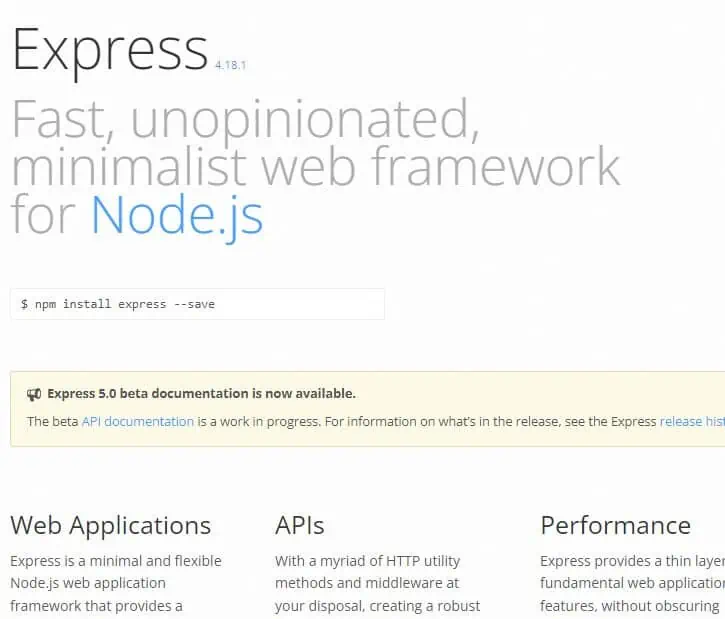Node.js: A Game-Changer for Software Development Projects
Are you tired of slow and inefficient software development projects? Do you want to improve your team’s productivity and create applications that can handle heavy traffic? Look no further than Node.js!
This revolutionary JavaScript runtime environment has been changing the game for software development projects since its introduction in 2009. From backend to frontend to full-stack development, Node.js offers unparalleled speed, scalability, and performance, making it a game-changer for any project.
In this article, Debugbar will explore with you :
- All the basics of Node.js
- Its benefits for app development projects
- And real-world examples of companies using Node.js to create cutting-edge applications
Get ready to unlock the full potential of your development team with Node.js!
What is Node.js?
Node.js is an open-source runtime environment based on Google Chrome’s V8 JavaScript engine that was created by Ryan Dahl in 2009 and has since become one of the most popular tools for web development today.
It enables developers to write both client-side and server-side code using JavaScript, allowing them to quickly create powerful web applications without having to use multiple languages or technologies.
So, with the introduction of Node JS, it became possible to carry out end-to-end development projects only with JavaScript.
Now that we know what Node.js is, let’s study it in more detail.
Node.js : The Basics
Before diving into the specifics of how node can revolutionize your software project let’s first take a look at some of the basics:
How to install Node.js?
It takes just a few minutes to install NodeJS on your computer! All you need is either Windows, Mac OS X ,or Linux :
- Then simply download the latest version from node’s official website
- Unzip the file contents onto your computer
- Double click “setup”
- Follow the prompts to install Node
and voilà ! You’re ready to start developing web applications with NodeJS!
What are the different versions of Node?
There are currently two versions of Node available : Version 6 (stable) & Version 8 (latest).
Depending on your needs you may want to choose either version depending on which will suit best ; but generally speaking version 8 should provide optimal performance.
What Data Types are supported?
Like other programming languages Javascript also supports various data types including:
- Strings
- Numbers
- Booleans
- Arrays
- Objects
- Etc.
The main difference however lies in how data is handled; node uses JSON (JavaScript Object Notation) instead of XML meaning that communication between different platforms happens much more quickly than before ; resulting in faster loading times.
Mastering The Fundamentals Of Node.js : Key Features And Benefits
Now that we know exactly what Node.js is, we can begin to look into some specifics regarding how to utilize this powerful tool to maximize our potential when developing projects!
So let’s dive straight into some features benefits offered by this revolutionary technology:
- Event Driven – One major advantage that sets apart from other server scripting environments like PHP, Javascript, etc.
Due fact code runs an event loop instead of following sequence instructions ; this allows user access input/output operations even while handling other tasks simultaneously resulting in enhanced efficiency overall.
- Non Blocking I/O Model – Unlike traditional blocking I/O models that require the program to wait for certain tasks to be completed before executing the next set of instructions, the non-blocking approach allows the user to execute multiple operations at the same time, significantly reducing the time required to complete the project.
- Open Source – Accessible via Github NPM (node package manager); all source code is freely available so there are no licensing fees associated with using this technology, making it an ideal choice for projects of any size, regardless of budget constraints!
- Growing Community – With a growing community of users offering support and advice when needed, new features are added regularly and a dynamic discussion forum accompanies the website, keeping you at the forefront of the latest developments!
These factors combined mean that if you choose to develop your project using nodes, you’ll never run out of options to expand your knowledge base and increase your efficiency while doing so!
Also read : Top 8 open source AI models to elevate your projects
Node vs Other Server Side Languages: What Makes Stand Out ?
With so many programming languages available today, each with their own features and capabilities, one might wonder if it’s not worth investing the time to learn something else rather than sticking to the tried and true methods that have been used for years?
In fact, there are clear advantages to choosing one language over another when it comes to creating web applications, especially those that involve real-time functionality!
Let’s explore some of them in more detail:
- Faster execution time – Since NodeJS uses the previously mentioned non-blocking I/O model, it is able to execute instructions much faster than many competitors, as it doesn’t need to wait for something to finish before starting the next task!
- Greater Flexibility – When it comes to creating a complex app that requires juggling several different technologies at the same time, it becomes even more advantageous because the user can write both client-side and server-side code using the same language, i.e. javascript, which reduces the amount of effort needed to manage the entire process and therefore saves costs and energy in the long run!
Furthermore, once we get familiar enough, we can even incorporate frameworks such as Express MongoDB and others to simplify the workflow even more!

- Reduced Development Costs – Since the source codes are free, you don’t spend money on licensing fees, which allows you to allocate resources elsewhere and thus save more money over time!
Also, because of the superior performance scalability compared to other solutions like Java, PHP, etc., you need fewer resources to maintain a certain level of production, which improves the cost efficiency exponentially!
Companies Using Node.js For Backend Development : Real World Examples
To get an idea of how successful they have been in implementing this technology in their respective operations, here are some real-life examples of companies that have done so!
Let’s look at a few in more detail:
- Netflix – The world’s leading subscription streaming service; Netflix moved from Java Ruby back-end development to utilize enhanced capabilities when handling high volumes of traffic simultaneously.
This move allowed them to streamline their entire operations, which in turn improved their efficiency and cost effectiveness!
- Uber – One of the world’s best-known ride-sharing companies; Uber also turned to node.js to improve the user experience for both drivers and customers.
With the superior scalability offered by nodes, they were able to create a feature-rich application with minimal resources required to maintain it!
- PayPal – Paypal is another industry giant that has chosen to utilize the capabilities of NodeJS.
With a superior non-blocking I/O model, they were able to process a large number of transactions in a fraction of the time it would normally take to achieve the same result! This improved customer satisfaction and overall system efficiency.
Node.js Challenges And Limitations
Despite its numerous advantages there are some challenges and limitations associated with using Node.js for software development projects. These include:
- Lack of Documentation – As Node.js is a relatively new technology, the amount of documentation available is still limited compared to other languages and frameworks; making it difficult to find answers to specific questions or Learning how to integrate different features into your project.
- Difficulty Debugging – While Node.js comes with many helpful debugging tools, they can be difficult to use and require a certain level of experience before they can be effectively implemented.
Additionally, many errors can be hard to trace back due to the asynchronous nature of Node’s event loop model, meaning that experienced developers are often needed in order to successfully debug complex problems.
- Low Performance – Although Node’s I/O model allows for handling multiple requests simultaneously, the performance can suffer when compared to other languages such as Java or C++ due to its lack of multi-threaded support.
Therefore, it is important to consider how much load your system will be under when choosing a language for your project.
Which tools will streamline Node.JS application development?
There are various tools that your development team can use to streamline their work. Among them, we particularly recommend the Express.JS framework, which will allow you to publish the developed app easily.
Express JS eliminates the need to refresh the app to see the changes introduced in the code layer. It can cut your coding time even by half and makes scaling a piece of cake.

When it comes to testing, you can implement various tools. For asynchronous testing, Mocha will be perfect.
You can use the majority of assertion libraries with Mocha. Its simple interface makes testing fun and simple.
As you can see, node.js is really a game changer. However, it is difficult to understand when you don’t know how to code. Is this your case? Don’t worry, there are specialized developers who know how to master Node like nobody else.
Where to find good Node JS developers?
Whether you are migrating to Node from a different environment, or you are developing your app with it from scratch, you will need a solid support of a specialized development team.
There are numerous nodeJS developers in Poland and all around the world, and they have an impeccable reputation as skillful, experienced, communicative, and easy to work with.
You may also consider including Node.JS in your tech stack without hiring additional specialists, but in this case, your team should be experienced with JavaScript.
It has a steep learning curve, so otherwise, you’d have to invest a lot of time and money.
Node.js in a nutshell
Node.js is a game-changer for application development projects, providing unparalleled speed, scalability, and performance.
- It enables developers to write both client-side and server-side code using JavaScript, making it possible to carry out end-to-end development projects only with JavaScript.
- Companies like Netflix, LinkedIn, and PayPal have adopted Node.js for their backend development, paving the way for others to unlock the full potential of their development teams.
- Node is Open Source, it’s therefore freely accessible via Github NPM (Node Package Manager).
- You need Windows, MacOs or Linux to install nodejs on your computer.
- It’s possible to integrate framework as Express MongoDB or Express.js to streamline your workflow.
- Node uses JSON (Javascript Object Notation) to handle data.